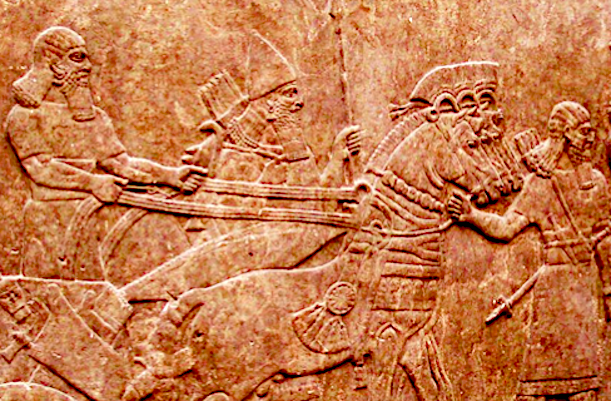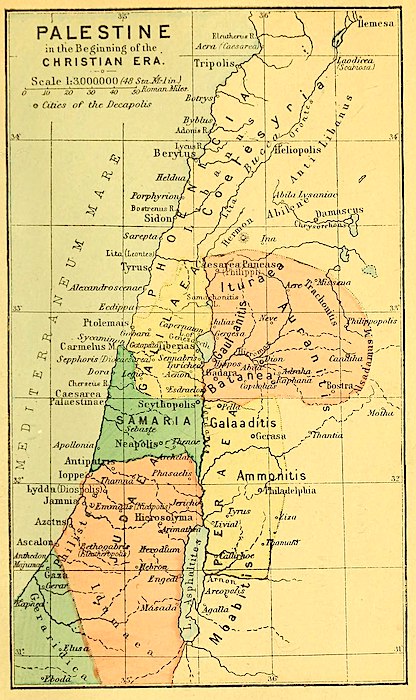
Many are familiar with the term “Edomite Jews” — a type of “Jew” that was created when John Hyrcanus, the Hasamonean King of Judea conquered Idumaea — or Edom — circa 110 BC and forced circumcision on the Edomites on condition of their citizenship in Judea.
According to Flavius Josephus,
“Hyrcanus also captured the Idumean cities of Adora and Marisa and after subduing all the Idumeans, permitted them to remain in their country as long as they had themselves circumcised and were willing to observe the laws of the Jews. And so, out of attachment to the land of their fathers, they submitted to circumcision and to make their manner of life conform in all other respects to that of the Jews. And from that time onward they have continued to be Jews.”
—Josephus, Antiquities of the Jews, Book 13, 257-58
Josephus, who wrote for a Greek-speaking audience, never used the word “Jew” here — a much later English word — rather, he used the Greek word “Ioudaios” which would have meant “Judean” — or citizen of Judea. Josephus — a devout Hasmonean “Jew” himself — would never have meant to suggest that the Edomites were ever accepted as racial Judahites or Israelites merely because they were circumcised.
After all, for the Hasmoneans, it was standard practice to enforce circumcision on those they conquered — just as Jewish slave traders would circumcise their slaves as sign of ownership.
Prior to the rise of the Hasmoneans, Judea was part of the Selucid Empire — and under the rule of Antiochus IV Epiphanes (215 – 164 BC), Judea was zealously Hellenized, and the religious practices of the Hebrews were suppressed, most notably circumcision:
“Now Antiochus was not satisfied either with his unexpected taking the city (Jerusalem), or with its pillage, or with the great slaughter he had made there; but being overcome with his violent passions, and remembering what he had suffered during the siege, he compelled the Jews to dissolve the laws of their country, and to keep their infants uncircumcised, and to sacrifice swine’s flesh upon the altar; against which they all opposed themselves, and the most approved among them were put to death.”
—Flavius Josephus, The War of the Jews, Book 1.1 §2
Under the Maccabees, the Hasmoneans retook Judea from the Syrian Selucids and reinstituted circumcision among the Israelites there — though many of these Israelites remained assimilated uncircumcized Judeans — or “gentiles” — and are counted among those in the New Testament as “the uncircumcised.”
And while circumcision among Israelites was voluntary, it was not so among those peoples — such as the Edomites — whom they conquered.
In fact, there were many peoples Alexander Jannaeus, King of Judea ( 103- 76 BC) conquered who refused to submit to circumcision — and were utterly destroyed:
“Now at this time the Jews were in possession of the following cities that had belonged to the Syrians, and Idumeans, and Phoenicians: At the sea-side, Strato’s Tower, Apollonia, Joppa, Jamhis, Ashdod, Gaza, Anthedon, Raphia, and Rhinocolura; in the middle of the country, near to Idumea, Adorn, and Marissa; near the country of Samaria, Mount Carmel, and Mount Tabor, Scythopolis, and Gadara; of the country of Gaulonitis, Seleucia and Gabala; in the country of Moab, Heshbon, and Medaba, Lemba, and Oronas, Gelithon, Zorn, the valley of the Cilices, and Pollo; which last they utterly destroyed, because its inhabitants would not bear to change their religious rites for those peculiar to the Jews. The Jews also possessed others of the principal cities of Syria, which had been destroyed.”
–Josephus, Antiquities of the Jews, Book 13, 395
However, this forced circumcision was not necessarily a sign that the vanquished were now accepted as fellow “Jews” of equal standing in the faith — which was based on bloodlines and spirituality.
King Herod (72 – 4 BC) came from one of these families of recent Edomite converts — and he was never accepted by the “Jews” of Judea as a real “Jew”. Josephus describes how Herod was referred to derogatorily,
“But Antigonus, by way of reply to what Herod had caused to be proclaimed, and this before the Romans, and before Silo also, said, that ‘They would not do justly if they gave the Kingdom to Herod; who was no more than a private man, and an Idumean, i. e. an half Jew’…”
— Josephus. The Antiquities of the Jews. book 14, chap 15, section 2.
If the “Jews” rejected King Herod as a real “Jew” — that is, an Israelite from the tribes of Judah, Benjamin and Levi — then it’s just as likely they would have rejected all Edomites as real “Jews”, regardless of circumcision and Judean citizenship. And that seems to have been the case.
It should be noted that, according to Josephus, the Pharisees disagreed with Hyrcanus’ policy of forced conversion of Edomites — and this disagreement contributed to Hyrcanus switching from being a Pharisee to joining the Sadducees.
If true, then we must ask the question — would not the Pharisees then reject any converted Edomites from joining their ranks? After all, according to Josephus, King Herod — the “half Jew” never set foot in the Temple in Jerusalem, most likely because he was not a bona fide “Jew”. And if Herod was not allowed in the Temple, it’s highly unlikely other Edomites were allowed in either.
Recall that according to Josephus, the Edomites accepted circumcision not because they wanted to become “Jews” — but rather because they wanted to continue to live in the “land of their forefathers” — which was now the southern part of the Kingdom of Judea.
Which brings us to the Itureans — who dwelt in the land east of Galilee. The exact origin of the Itureans is still open to debate — though many biblical scholars falsely believe that they were descendants of Ishmael — and therefore “Arabs” — which most certainly is not the case. The Arabs did not occupy that land until their conquests after 700 AD.
The Greek historian Strabo identified the Itureans as Syriac-Aramaeans — an Aramaic-speaking nomadic people — predatory marauders who plundered farmers and traders in that region northeast of Samaria.

The Itureans shared common cause with the Judean Hasmonian kings who sought to undermine the Selucid dominance of Judea — and when the Hasmonians conquered the Iturians to that end, like the Edomites, the Iturians were circumcised and forced to “convert”.
According to Josephus,
[Aristobulus, King of Judea c. 104 – 105 BC] was called a lover of the Grecians; and had conferred many benefits on his own country, and made war against Iturea, and added a great part of it to Judea, and compelled the inhabitants, if they would continue in that country, to be circumcised, and to live according to the Jewish laws. He was naturally a man of candor, and of great modesty, as Strabo bears witness, in the name of Timagenes; who says thus: “This man was a person of candor, and very serviceable to the Jews; for he added a country to them, and obtained a part of the nation of the Itureans for them, and bound them to them by the bond of the circumcision of their genitals.”
–Josephus, Antiquities of the Jews, Book 13, 318
So we see here that the Itureans experienced the exact same forced “conversion” as did the Edomites when they were absorbed into the Kingdom of Judea — they were given citizenship and expected to live under the laws of Judea — but there’s no evidence that these Itureans were ever accepted as “Israelites” or real Judahites.
And just as is the case of the Edomites, the Itureans are mentioned only once in the New Testament — in Luke 3:1 — as subjects of the Herodian tetrarchs:
“Now in the fifteenth year of the reign of Tiberius Caesar, Pontius Pilate being governor of Judaea, and Herod being tetrarch of Galilee, and his brother Philip tetrarch of Ituraea and of the region of Trachonitis, and Lysanias the tetrarch of Abilene.”
It would seem rather odd that the Edomites — or “Idumaeans” as they were known to the Greeks and Romans — are mentioned only once in the New Testament — as one among many peoples who came into Jerusalem to hear Christ speak:
“And from Jerusalem, and from Idumaea, and from beyond Jordan; and they about Tyre and Sidon, a great multitude, when they had heard what great things he did, came unto him.”
—Mark 3:8
This verse in Mark seems to suggest that the Edomites did not live in Jerusalem — that despite having been granted Judean citizenship under Hyrcanus, they largely remained in that part of southern Judea where their forefathers had dwelt — according to Josephus.
Unlike the Itureans, some Edomites did worm their way into the highest echelons of power in Judea under Herod and his sons and brothers — one of whom, Philip, became the tetrarch over the Itureans. But the question remains — were these Edomite converts like Herod ever accepted as legitimate “Jews” among the Israelites in Judea?
There seems to be some evidence that after the destruction of the Temple in Jerusalem in 70 AD the Edomites of Judea sided with the “Jews” in their subsequent rebellions against the Romans — and perhaps it was at that time and thereafter that these people entered into forbidden marriages which resulted in the Hebrew bloodline absorbing the Edomite peoples, but that is merely speculation — along with some tenuous Khazarian lore that claims distant Edomite ancestry.
What we do know, however, is that today’s “Jews” most certainly are the spiritual inheritors of Esau-Edom as the eternal enemies of the true Israelite people — and if any people today fulfill many of the prophecies regarding Edom — and the “synagogue of satan” — it most certainly is this revolutionary people today who masquarade as “Jews.”
And no one, as far as we can tell, have ever accused today’s “Jews” of actually being Itureans, despite the fact that they underwent the same circumcision and “conversion” as the Edomites did.